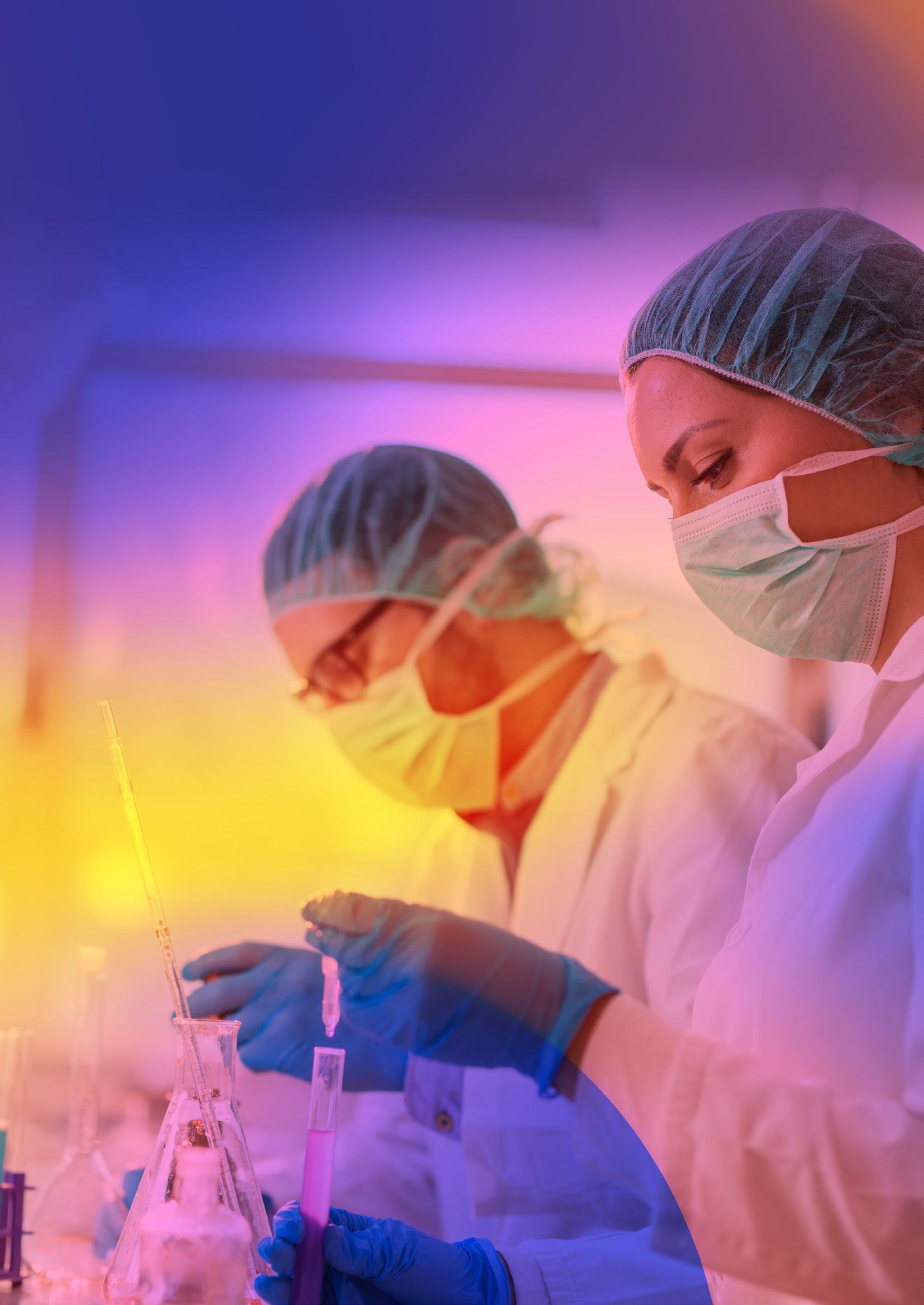ANNUAL REPORT 2021-2022



It was with great vision that Research Australia was established over 20 years ago by Peter Wills AC and our esteemed new Patron Emeritus Professor Christine Bennett AO, following the 1999 Strategic Review which found that Australia needed a dedicated organisation to shine the light on our amazing health and medical researchers.
After the National Health and Medical Research Strategy was announced at Research Australia’s Awards in December 2021, we continued to advocate for a nationally coordinated approach for investment in all stages of research.
Ahead of the 2022 Federal election, Research Australia hosted a Pre-Election Summit to set the policy objectives needed to strengthen our health and medical research sector. This culminated in our Pre-Election Statement on behalf of the health and medical research sector, which advocates for four key recommendations, including a national health and medical research strategy and national health and medical research workforce plan.
Research Australia was delighted to receive strong support from our sector and strong commitment across the political divide to support our world-class researchers to advance our sovereign capability to innovate and translate research into improved health and economic outcomes for Australia.
During the year Research Australia was thrilled to work even more closely with some of our members on individual projects, by providing our national expertise in the health and medical research ecosystem.
We worked with Arthritis Australia and people living with arthritis to understand what research activity is needed in this condition. We collaborated with Novo Nordisk looking at future directions for Australia’s world-leading obesity research. We partnered with the wonderful Childhood Dementia Initiative, as well as working with the University of Western Australia and Connectivity, a not for profit organisation specialising in traumatic brain injury support, to understand traumatic brain injury. This informative work has been published in the Journal of Head Trauma Rehabilitation.
Our motivation is to enable sector wide opportunities and benefits for our members, as well as the health and medical research sector more broadly. Research Australia could not do the work that we do, or achieve the amazing outcomes that we achieve without the support of our members, across the entire health and medical research pipeline.
On behalf of the Board I would like to thank our CEO and Managing Director, Nadia Levin, who continues to skillfully guide the organisation. I also thank her for her astute and dedicated approach to health and medical research innovation and sustainability. My sincere appreciation and thanks to all my Board colleagues for their advice and support over the past year.
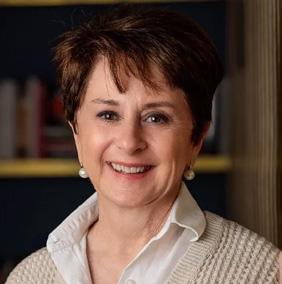
I look forward to next year to seeing the continuation of Research Australia’s work championing our impressive health and medical research sector, maximising impact in areas of greatest need – with the ultimate goal in mind; improving Australians’ health outcomes.
Chair
Research Australia’s role is to help Australia’s world leading health and medical researchers, to ensure the policy and funding architecture of our sector is solid.
Australia’s health and medical research sector can fulfil its potential as a cornerstone of a post-carbon Australian economy, but we must have the industrial capacity, the manufacturing sector, and the skills to make this happen.
We have to take a cohesive approach to the challenges that face our sector, regardless of geography. We must support the generation who will one day step up as the next leaders of our vibrant and world leading health and medical research sector – our early and mid-career researchers.
One in five scientists indicated they plan to leave the profession entirely in the coming years.1 These are the faces of a modern health and medical research workforce, a workforce we cannot take for granted.
All researchers need the active support of their workplaces if they are to have the time and resources they need to undertake research. But no one feels this more acutely than the clinician researchers because the health system is a hungry beast and the clinical work is always there. The combination of research and clinical work – in all healthcare disciplines; surgical, medical, nursing, midwifery and allied health – is incredibly valuable, both to clinical and commercial innovation.
That is why Research Australia continues to focus on new ways to support our health and medical research workforce, especially clinician researchers and early and mid career researchers. We must define the workforce the country needs and wants for the world’s best future health system with research, innovation and commercialisation firmly embedded. Australian can attract and support a highly skilled, sustainable research workforce with circular mobility between academia and industry. Key to this is ensuring that universities (and others) are equipped to train the next generation of researchers.
The nascent golden age in Australian health and medical research will bring further exploration of advanced therapeutics and novel therapies. Australia can have a genuinely world scale health industry supported by world leading research and a health system that is second to none.

It is Research Australia’s members, from right across the health and medical research pipeline, that fill me with optimism that with the right support, our sector has the talent we need to bring Australian discoveries to life on Australian soil.
On behalf of Research Australia, we are determined to take the organisation’s incredible work over the past 20 years and turn this into meaningful change for our sector. We look forward to taking you all on that journey with us. Together we can enable and design a stronger, more sustainable health and medical research system.
 Nadia Levin
CEO & Managing Director, Research Australia
Nadia Levin
CEO & Managing Director, Research Australia
With appreciation to our Chair and Board of Directors who are tireless in their advocacy for health and medical research. They represent the sector across the public and private sector. Thank you all for your contribution.
Chair since December 2020 Former Executive Leader, Bupa Health Foundation Director since May 2015
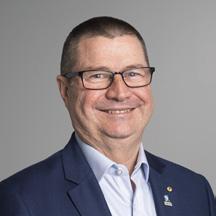


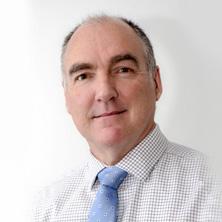
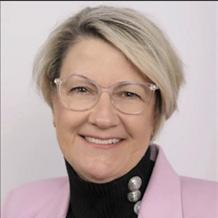

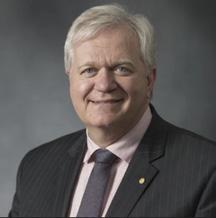
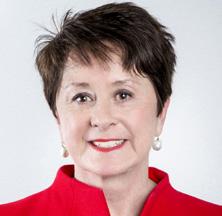 Assoc. Prof Annette Schmiede
Professor Brian P. Schmidt AC FAA FRS Vice-Chancellor and President, Australian National University Director since May 2021
Peter Wills AC Director, Wills Advisory Pty Ltd Founder and Director since 2000 Deputy Chair from February 2011 to February 2021
Elizabeth Koff AM Managing Director, Telstra Health Director since July 2022
Dr Andrew Nash Senior Vice President –Research, CSL Limited Director since November 2013
Professor Dawn Freshwater Deputy Chair since February 2021 Vice-Chancellor, The University of Western Australia Director since August 2019
Assoc. Prof Greg Kaplan Chief Operating Officer, Ingham Institute Director since November 2014
Assoc. Prof Annette Schmiede
Professor Brian P. Schmidt AC FAA FRS Vice-Chancellor and President, Australian National University Director since May 2021
Peter Wills AC Director, Wills Advisory Pty Ltd Founder and Director since 2000 Deputy Chair from February 2011 to February 2021
Elizabeth Koff AM Managing Director, Telstra Health Director since July 2022
Dr Andrew Nash Senior Vice President –Research, CSL Limited Director since November 2013
Professor Dawn Freshwater Deputy Chair since February 2021 Vice-Chancellor, The University of Western Australia Director since August 2019
Assoc. Prof Greg Kaplan Chief Operating Officer, Ingham Institute Director since November 2014
A special thank you to Professor Foley AM, Professor Little and Warren Bingham for their years of tenure and huge contribution to the work Research Australia has been doing. Professor Foley has anchored many Research Australia political engagements and leant her health system expertise to our work. We are very grateful to have Professor Foley continuing on the Board in an honorary advisory capacity and as part of the Awards Subcommittee. Professor Little has supported the organisation tremendously as a Board Director since August 2019. Warren became a Board Director in 2020 and has supported the organisation for many years – particularly championing the commercial end of the pipeline. As we always say at Research Australia, you may have retired from the Board, but you remain in the family.

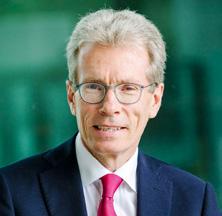
Research Australia is delighted to announce the appointment of Emeritus Professor Christine Bennett AO as a Research Australia Patron. Commencing November 2022, Professor Bennett will serve as CoPatron alongside Sir Gustav Nossal AC.




Research Australia would not exist today without Professor Bennett’s efforts in establishing Research Australia as the national voice of all stages of health and medical research. She has a detailed understanding of the health system and the respect of our wonderful research community, and the Research Australia Board is thrilled that she takes on the Patron role.
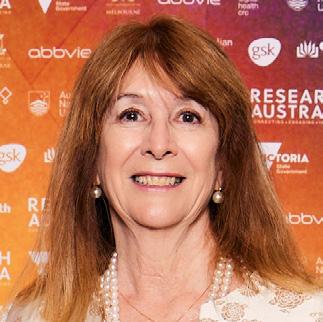
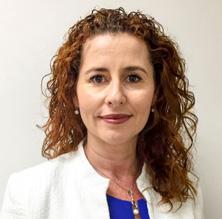 Professor Nicholas Fisk Deputy Vice-Chancellor (Research), UNSW Sydney Director since December 2015
Professor Mary Foley AM Former Managing Director, Telstra Health Director since August 2017 – term ended July 2022
Jenny Morawska Chief Executive Officer & Managing Director, The Morawska Group Director since November 2017
Warren Bingham Founder and Executive Chairman, MedTech International Director since July 2020 –term ended December 2022
Nadia Levin Chief Executive Officer & Managing Director, Research Australia Director since January 2016
Professor Melissa Little Theme Director of Cell Biology, Murdoch Children’s Research Institute
Director since August 2019 –term ended December 2022
Professor Nicholas Fisk Deputy Vice-Chancellor (Research), UNSW Sydney Director since December 2015
Professor Mary Foley AM Former Managing Director, Telstra Health Director since August 2017 – term ended July 2022
Jenny Morawska Chief Executive Officer & Managing Director, The Morawska Group Director since November 2017
Warren Bingham Founder and Executive Chairman, MedTech International Director since July 2020 –term ended December 2022
Nadia Levin Chief Executive Officer & Managing Director, Research Australia Director since January 2016
Professor Melissa Little Theme Director of Cell Biology, Murdoch Children’s Research Institute
Director since August 2019 –term ended December 2022
Research Australia envisions a world where Australia unlocks the full potential of its world-leading health and medical research sector to deliver the best possible healthcare and global leadership in health innovation.
To use our unique convening power to position health and medical research as a significant driver of a healthy population and contributor to a healthy economy.
CONNECT researchers, funders and consumers to increase investment in health and medical research from all sources.
ENGAGE Australia in a conversation about the health benefits and economic value of its investment in health and medical research.
INFLUENCE government policies that support effective health and medical research and its routine translation into evidence-based practices and better health outcomes.

Research Australia forums are convened to unite the health and medical research sector on a common platform. They provide unique opportunities for members and key sector influences to connect, put their policy ideas into play and collaborate with other members who have similar goals or requirements.
The nation’s brightest scientific minds and advocates have been recognised in Research Australia’s 19th Health and Medical Research Awards, celebrating the extraordinary researchers, philanthropists, and community champions who are leading work with transformational impact for patients and the health sector.
Acknowledging talent and excellence in our sector is not only a key part of Research Australia’s role in advocating for health and medical research, it is also paramount to encouraging future generations of great researchers. Thank you again to all the nominees, nominators and members for helping Research Australia celebrate the world-class ability and dedication within this sector.
Assistant Minister for Health and Aged Care the Hon Ged Kearney MP delivered the keynote address at the event, announcing a National Women’s Health Advisory Council to address stark differences in the health outcomes for women and girls.
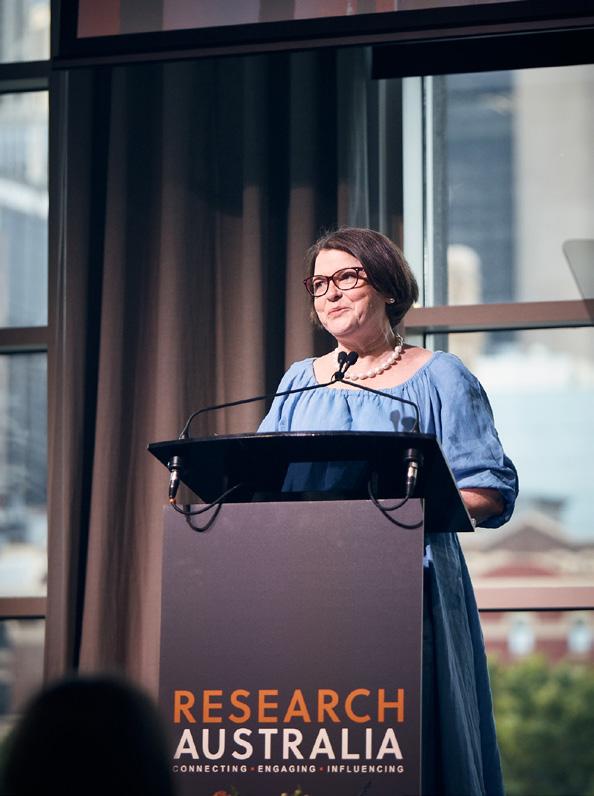
The Shadow Minister for Health & Aged Care, Senator the Hon Anne Ruston (representing the Leader of the Opposition the Hon Peter Dutton MP) presented the Great Australian Philanthropy Award. Dr Monique Ryan MP (Member for Kooyong) presented the Advocacy (AbbVie) Award.
Research Australia sincerely thanks the 2022 Award Sponsors, including our premium event partner the University of Melbourne, Griffith University, Australian National University, AbbVie, the Victorian Government (DJPR), Digital Health CRC and GSK . Supporting research is as important as the research itself, and our gratitude goes to all those who help drive these achievements.
As per tradition, the winners were announced on the night of the gala dinner and Award ceremony. Our website features all the winners and highly commended so please click here to view.

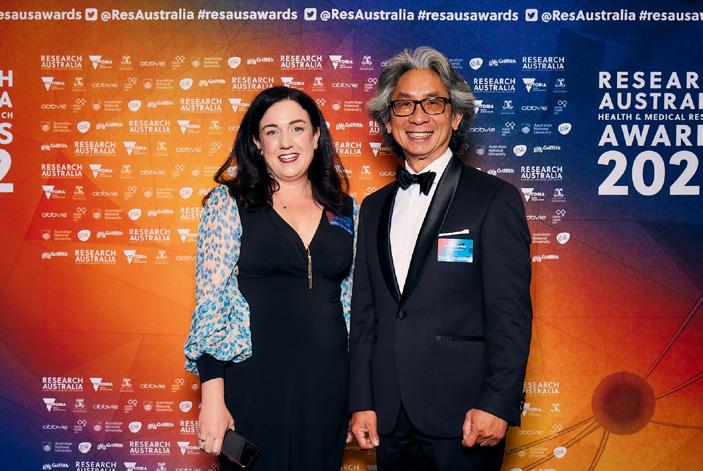
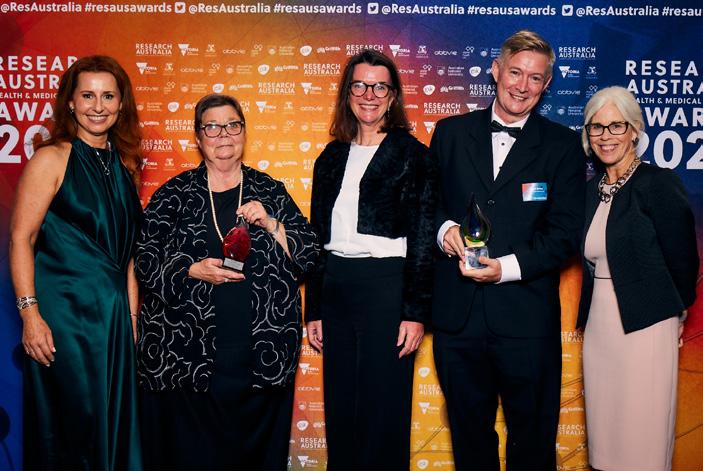
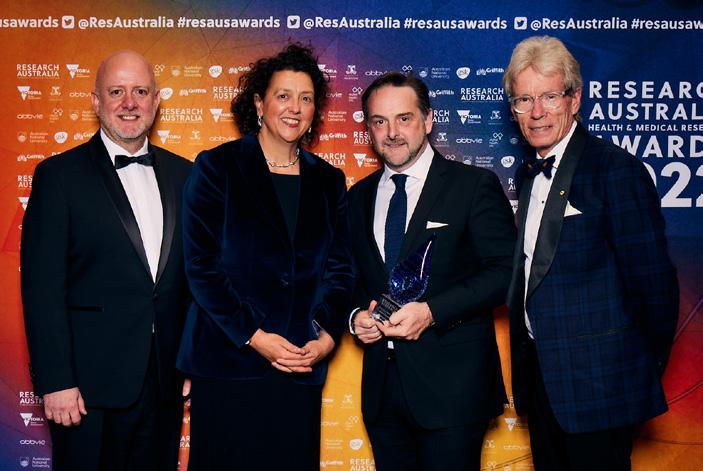
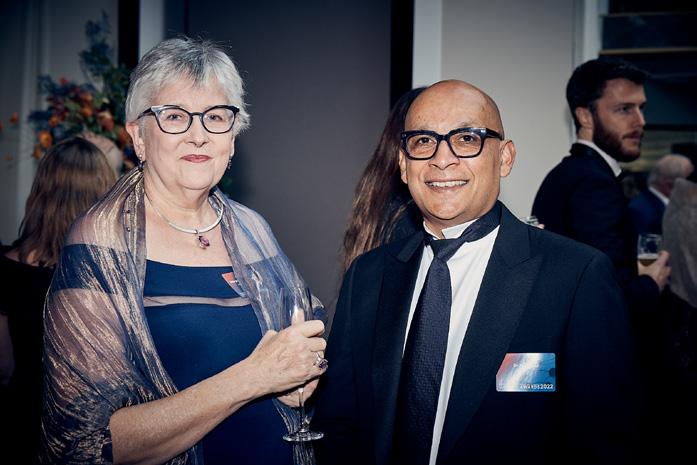
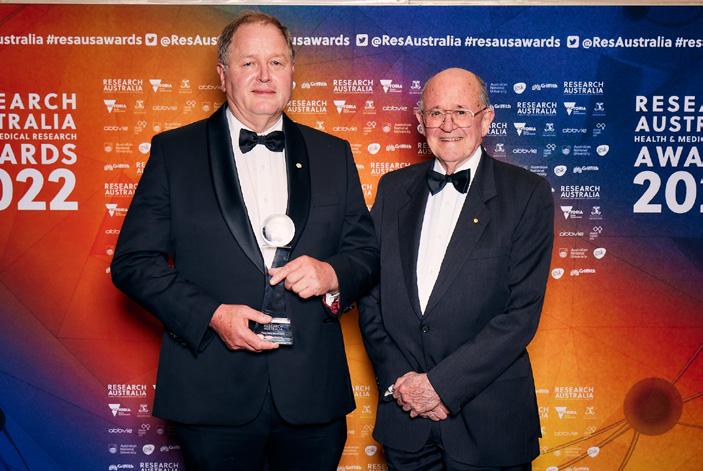
 Research Australia Chair, Assoc Prof Annette Schmeiede and Nadia Levin, CEO of Research Australia, and Emeritus Prof Christine Bennette AO, recently appointed Patron of Research Australia
Great Australian Philanthropy Award presented by Shadow Minister Senator Ruston (middle) to Mr and Mrs Roy and Nola Thompson, collected by Russell Ousley. Highly Commended awarded to to Ms Dianne Garner for Gretel and Gordon Bootes Medical Research & Education Foundation. Joined by Research Australia Deputy Chair Prof Dawn Freshwater (right)
GSK Award for Research Excellence winner, Prof Georgia Chenevix-Trench (left) and Dr Alan Paul, Country Medical Director, GSK (right)
Peter Wills Medal presented by Mr Peter Wills AC (right) Prof Ian Alexander (left)
Research Australia General Manager, Lucy Clynes, and Dr Tien Kieu MLC, Victorian Member for South Eastern Metropolitan
Research Australia Chair, Assoc Prof Annette Schmeiede and Nadia Levin, CEO of Research Australia, and Emeritus Prof Christine Bennette AO, recently appointed Patron of Research Australia
Great Australian Philanthropy Award presented by Shadow Minister Senator Ruston (middle) to Mr and Mrs Roy and Nola Thompson, collected by Russell Ousley. Highly Commended awarded to to Ms Dianne Garner for Gretel and Gordon Bootes Medical Research & Education Foundation. Joined by Research Australia Deputy Chair Prof Dawn Freshwater (right)
GSK Award for Research Excellence winner, Prof Georgia Chenevix-Trench (left) and Dr Alan Paul, Country Medical Director, GSK (right)
Peter Wills Medal presented by Mr Peter Wills AC (right) Prof Ian Alexander (left)
Research Australia General Manager, Lucy Clynes, and Dr Tien Kieu MLC, Victorian Member for South Eastern Metropolitan
The Research Australia University Roundtable continues to be a significant forum that encourages frank discussion and debate which can then be used to shape the thinking for Research Australia’s advocacy on behalf of the sector.
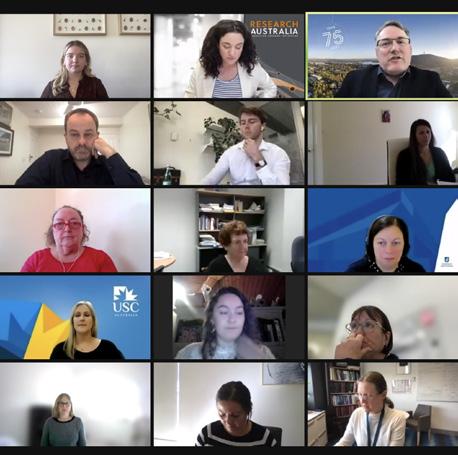


Four University Roundtables were held in the financial year:
◆ 26 August 2021, saw the discussion continue on the role of the clinician researcher, focusing on what the clinician researcher brings to the health system and by extension to the broader Australian community. The Roundtable heard from a panel discussion which included Executives of three major Australian health care providers – both public and not-forprofit health systems.
◆ 24 November 2021, the final Roundtable of 2021 discussed the role of universities in Australia’s future and attendees were given a presentation on the national consultation Research Australia undertook on a National Health and Medical Research Strategy. The Roundtable also discussed potential topics and priorities for 2022, and there was strong support for examining the wellbeing and career prospects of early- and mid-career researchers (EMCRs).
◆ 16 March 2022, focused on engaging universities with industry. There was a presentation from the NHMRC on potential actions to address gender disparity in the outcomes of the NHMRC Investigator Program. This Roundtable also provided an update on Research Australia’s consultation with government, post the announcement from Minister Hunt to develop Vision 2040, a national strategy for health and medical research, which was made at the Research Australia Awards on December 9 2021.
◆ 18 May 2022, the discussion identified a range of issues affecting EMCRs and explored various initiatives being taken by different universities. There was an agreement that while this topic would remain a focus of the Roundtable it would be useful to create a dedicated working group to further explore and address these issues.
Panel discussion at Research Australia’s University Roundtable, August 2021 Key attendees at Research Australia’s November 2021 University Roundtable
The Health Economics Roundtable is a core group of leading Australian health economists that was established as a Research Australia roundtable in 2017 at the request of health economists.

The objective of this group is to ensure health economics is considered in the design of Government programs for delivering better health, a more effective health system and the commercial opportunities that stem from Australia’s global standing in health innovation.
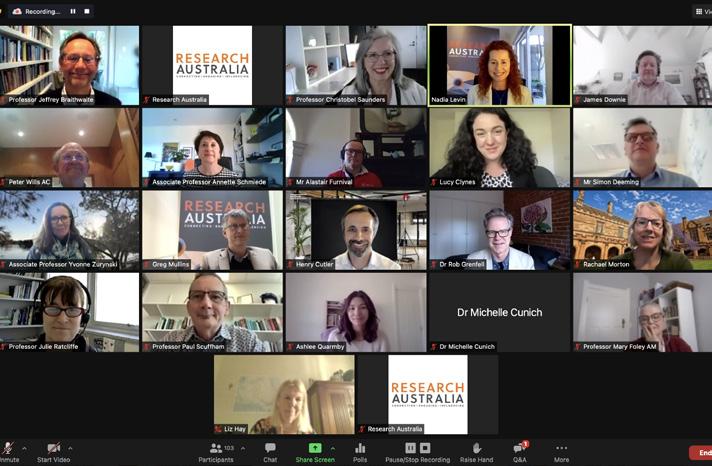
It also supports Research Australia’s advocacy in smarter investment in health and medical research. This includes calling for better alignment of existing sources of funding, promoting the economic value of health and medical research and championing the commercialisation of Australian research.
Two Health Economics Roundtables were held during the financial year:
◆ 5 October 2021, focused on the role for health and medical research in national moves to valuebased health care. This Roundtable was the most popular in terms of attendees. This was due to the keen interest across the health and medical research community sector in value-based health care. Speakers from across the health and medical research pipeline, as well as from federal and state governments, discussed their individual value-based health care initiatives, their ongoing projects, and the role of research in delivering improvements for Australia’s entire health system.
◆ 15 June 2022, focused on the health and economic impacts of obesity in Australia, and how the health and medical research sector can assist in implementing the vision outlined in the Australian Government’s National Obesity Strategy. Speakers took a deep dive into the role of health economics in implementing the National Obesity Strategy and the economic arguments for both lifestyle and therapeutic interventions for obesity.
Key attendees at Research Australia’s October 2021 Health Economics RoundtableThe Philanthropy Roundtable is convened for Research Australia’s member organisations who exist specifically to fund their own or third party researchers or both, to discuss key issues affecting their fundraising capability, challenges the sector is facing and collaborative opportunities to ensure sustainable funding.
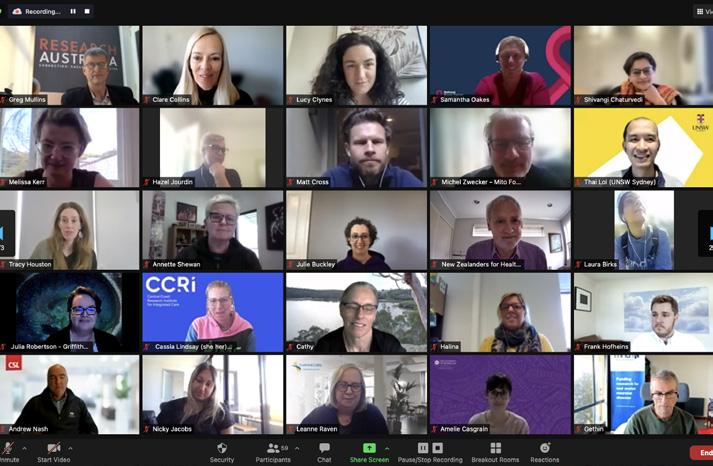
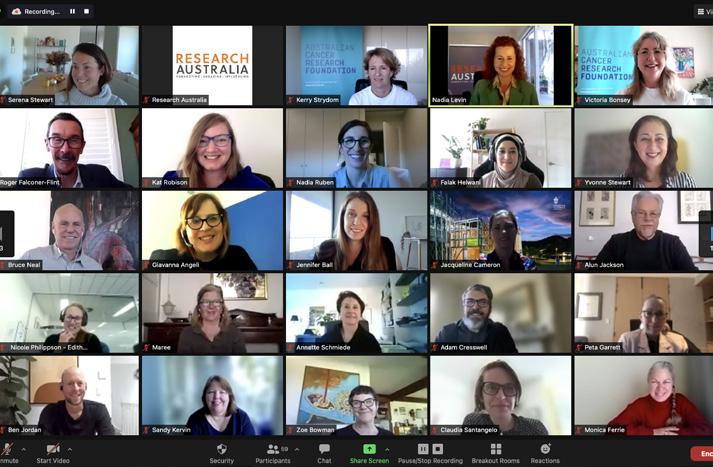
Research Australia advocates for smarter investment in our sector and this includes philanthropy. While government funding of HMR is the bedrock of this system, contributions from charities are also significant. It is imperative the governments, stakeholders and the greater community understand how essential the contributions made by philanthropists, corporates and individuals are to HMR.
The Philanthropy Roundtable held on 22 September 2021, discussed how funding is sourced and used at the Institute or Foundation level. Attendees shared their solutions for finding additional funds in the current economic environment post the background of the pandemic. The Roundtable heard from a range of Research Australia’s philanthropic members including the Cure Brain Cancer Foundation, Royal Australian & NZ College of Radiologists, Australian Cancer Research Foundation, The Sydney Children’s Hospital Foundation, The George Institute’s Join Us Register, and Rare Voices Australia.
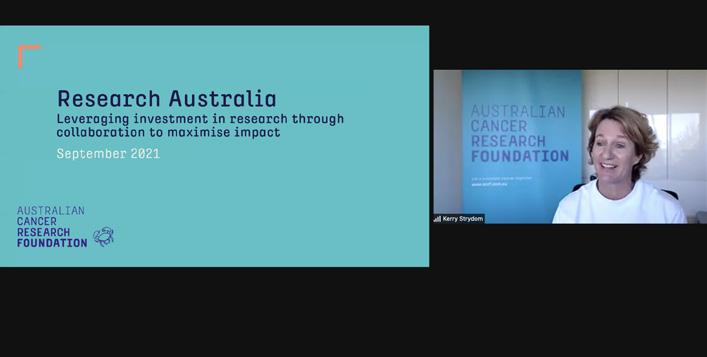 Key attendees at Research Australia’s September 2021 Philanthropy Roundtable
Key attendees at Research Australia’s September 2021 Philanthropy Roundtable


The early part of 2022 saw focused Government advocacy from Research Australia and our partners, regarding post-pandemic opportunities for health and medical research with MPs from across the political spectrum and State and Federal Departmental leaders.
In March, Research Australia held a Workshop with the Australian Department of Health, Vision 2040: A National Strategy for Health and Medical Research regarding a national approach to HMR strategy.
Ahead of the 2022 Federal election, Research Australia hosted a Pre-Election Summit to set the policy objectives needed to strengthen our health and medical research sector. Hosted in partnership with WEHI and CSL, the Summit saw medical researchers and innovators from around Australia join parliamentarians to advance Australia’s medical research and innovation capacity to improve health and economic outcomes for Australia.
Research Australia were pleased to be joined by parliamentarians from across the political spectrum including:
◆
Dr Katie Allen MP, Federal Member for Higgins and Co-Chair, Parliamentary Friends of Health and Medical Research
◆
The Hon Warren Snowdon MP, Federal Member for Lingiari and Co-Chair, Parliamentary Friends of Rural and Remote Health and Deputy Chair of Standing Committee on Indigenous Affairs.
The focus of the Pre-Election Summit was progression of the National HMR Strategy and workshopping our Pre-Election Statement on behalf of the health and medical research sector, which advocates for four key recommendations, including a national health and medical research strategy and national health and medical research workforce plan.
◆
◆
Ms Ged Kearney MP, Shadow Assistant Minister for Health and Ageing and Federal Member for Cooper
Senator Louise Pratt, Senator for Western Australia, Shadow Assistant Minister for Manufacturing and Shadow Assistant Minister for Employment Services
◆
Senator Dorinda Cox, Senator for Western Australia, Greens Spokesperson for Science, Research and Innovation; and Mining and Resources; and Trade
The Pre-Election Statement received support from key Research Australia members, including Australian Clinical Trials Alliance, The George Institute, ASCEPT, Medicines Australia, Australian Health Research Alliance, GSK, Society for Mental Health Research, Life Sciences Queensland, Franklin Women, AusBiotech, MS Australia, Health Services Research Association, ARCS Australia, Group of Eight Australia, AAMRI, Australian Centre for Heart Health, BioMelbourne Network and Australian Health Economics Society. The Pre-Election Statement was issued publicly post-Summit, receiving industry media coverage, including a podcast with Research Australia on Health Industry Hub.
The year 2022 saw an early Commonwealth Budget in March, followed by a General Election and a change of Government in May.
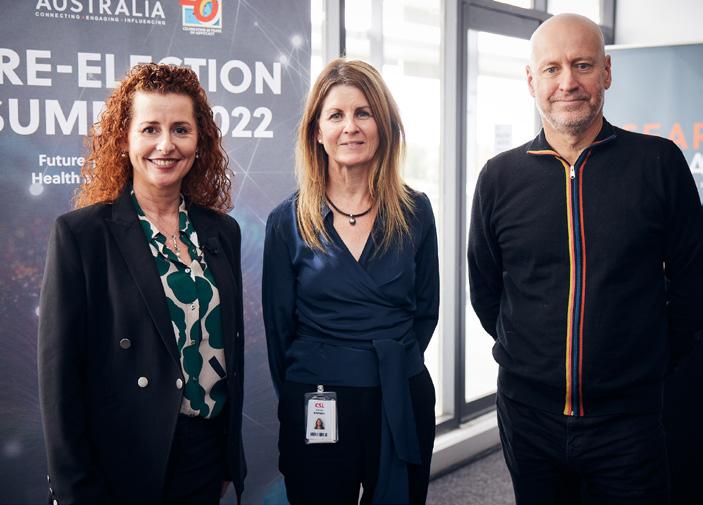
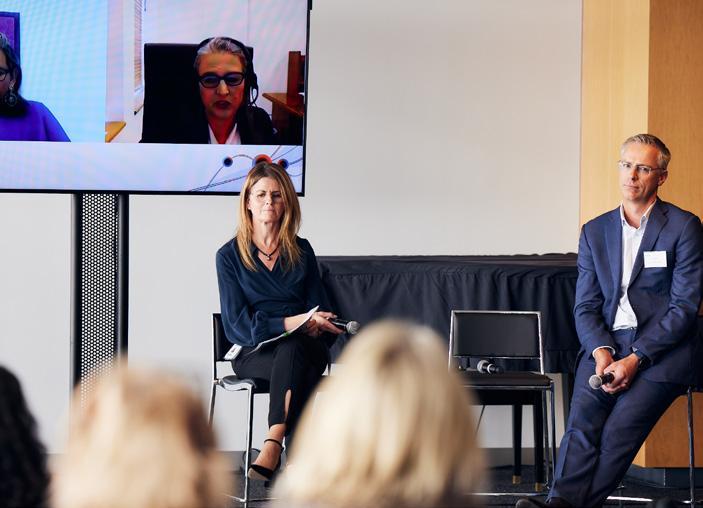

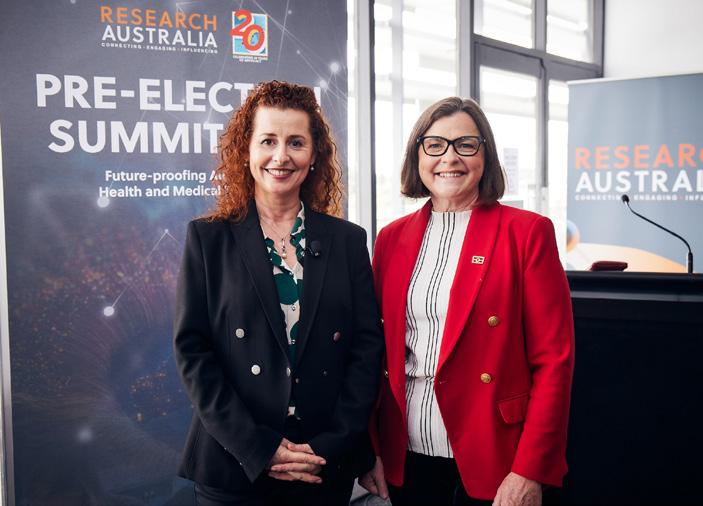
 Research Australia’s Pre-Election Summit partners, CSL and the Walter and Eliza Hall Institute (WEHI)
Panel discussion with Medicines Australia, the University of Melbourne and AAMRI
Senator Dorinda Cox and Senator Louise Pratt joined by CSL and Brandon Biocatalyst
Research Australia’s Pre-Election Summit partners, CSL and the Walter and Eliza Hall Institute (WEHI)
Panel discussion with Medicines Australia, the University of Melbourne and AAMRI
Senator Dorinda Cox and Senator Louise Pratt joined by CSL and Brandon Biocatalyst
Following the election of the Albanese Labor Government in May 2022, we continued building on our strong relationships with incoming Ministers and their staff, as would be expected of the national peak body.
The election brought with it two new MPs with medical qualifications, one of whom was a nominee for Research Australia’s Data Innovation Award in 2021. Dr Michelle Ananda-Rajah was elected as Labor Member for Higgins in Melbourne, after more than a decade as a clinician-researcher and physician in infectious diseases and general medicine at Alfred Health.
The other new doctor in the House is Dr Monique Ryan, Independent Member for Kooyong, also in Melbourne. Along with former Minister for Regional Health Dr David Gillespie, Member for Macarthur and Chair of the Standing Committee on Health, Aged Care and Sport Dr Mike Freelander, Dr Ryan is a Co-Chair of the Parliamentary Friends of Health and Medical Research, which Research Australia has re-established in the 47th Parliament.
The Friends group has agreed that our agenda will not necessarily be asking for more money, but making sure the money the Government is investing is spent in the right places, the right disease areas, and addressing the right burdens of disease. Other issues to be addressed include low success rates with NHMRC grants, Earlyto-Mid-Career-Researchers being mostly on 12-month contracts, and the high rates of stress that surveys are reporting from this cohort. With medical science being one of the seven areas of focus for the newly established $15bn National Reconstruction Fund, the group will also focus on where this can be best invested.
We look forward to holding a number of functions at Australian Parliament House next year where these ideas can be discussed by legislators and researchers.
Research Australia holds regular meetings with State and Territory Government Departments responsible for overseeing health and medical research. These meetings keep both Research Australia and the governments apprised of what is happening in the HMR area in that state or territory.



Over the past year Research Australia was delighted to work even more closely with some of our members on individual projects, by providing our national expertise in the health and medical research ecosystem. Our motivation is to enable sector wide opportunities and benefits to our members, as well as the health and medical research sector more broadly.
Over the past year Research Australia has provided bespoke advice to:
◆ Arthritis Australia – speaking directly to those living with arthritis to understand what impactful arthritis research activity could be, and where impactful investment should take place. Research Australia developed three Reports for Arthritis Australia:



◆ Novo Nordisk – looking at Australia’s strengths in obesity research, and where we need to build the evidence for future progress. This work culminated in the Report, Australian Obesity Research: Global leadership and local change which was launched at Federal Parliament and NSW Parliament.
Global leadership and local change

◆ Childhood Dementia Initiative – developing a global picture of childhood dementia clinical research and opportunities for collaboration. This work was captured in our Report, Childhood Dementia Global Landscape Analysis and was used by the Childhood Dementia Initiative in their State of Childhood Dementia 2022 Report.
◆ Connectivity and the University of Western Australia – deepening the understanding of traumatic brain injury awareness, research, and support needs across the community. This work has now been published in the Journal of Head Trauma Rehabilitation, What Happens Next? Traumatic Brain Injury in the Community.
INSPIRE is Research Australia’s online publication showcasing its members’ research, innovation and leadership. Each quarter INSPIRE attracts a variety of articles that investigate the important areas to researcher’s and clinicians.






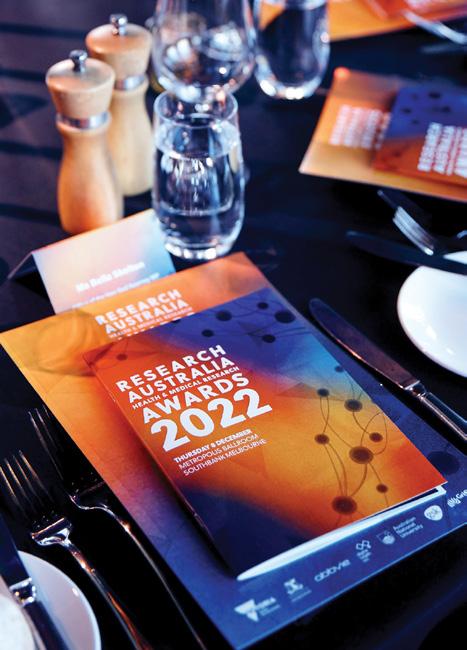


INSPIRE reaches around 1500 contacts from 140 organisations, across the health and medical research spectrum. INSPIRE has an impressive average reading time of nearly 9 minutes. To view visit researchaustralia.org

Research Australia has been seeking out the opinions of ordinary Australians’ on health and medical research and its role in our society since 2003.

The outcomes from these polls have been widely read across and often quoted by Government to broad range of audiences. Each year a full report is produced with the key highlights from the consumer poll and these are distributed through various channels including Research Australia members, government departments and the public.
We have summarised a snapshot of some of those opinions captured in our 2022 Opinion Poll:
◆ More funding for HMR remains in the public’s top 10 priorities for Australian Government spending, at number 7: behind Healthcare, Education and Infrastructure. When it comes to the public giving their own money, HMR is considered the cause most deserving of donations.
◆
In a year of massive climate disruption with widespread flooding, we look at the impact this has had on Australians’ views on climate change. Preparing our health system to cope with climate change is the top climate change rated priority for health and medical research.
◆
Since 2003
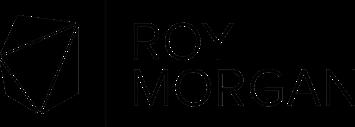
◆
More than two years into the COVID-19 pandemic support for vaccination remains strong, including for children under 5. The public’s trust of information on Government websites has increased since we last asked about this in 2017.
Nearly 7 in 10 Australians believe that aged care providers which also undertake research provide better care to residents.
◆ Health and Obesity has also been thrown into the spotlight by the Government’s new national Obesity Strategy and this poll has identified the public’s research priorities in this area. A range of measures to prevent and reduce weight gain have strong support.
◆

Over half of Australians indicated they would welcome their health professional alerting them to an opportunity to participate in research, with fewer than one in five not appreciating it.
The polling for this report was generously conducted by Roy Morgan Research, a Research Australia Member.
Research Australia has made multiple submissions in the last financial year and all submissions reflect not only the advocacy work of Research Australia but importantly, the views and input of our members. The details of these submissions can be viewed on Research Australia’s website here.
JULY 2021 Inquiry into the Mitochondrial Donation Law Reform (Maeve’s Law) Bill 2021 – Senate Standing Committee on Community Affairs
Primary Health Reform Steering Group’s Discussion Paper – informing the Australian Government’s Primary Health Care 10 Year Plan
AUGUST 2021 Mental Health and Wellbeing Act Engagement Paper - Victorian Government
Australian Data Strategy Discussion Paper – Australian Government Department of the Prime Minister and Cabinet
Patent Box Discussion Paper – Treasury
SEPTEMBER 2021 Investment Funds Legislation Amendment Bill (schedule 3, amending the MRFF Act) – Senate Finance and Public Administration Committees
OCTOBER 2021 National Medicines Policy 2021 Review – Australian Government MRFF Strategy 2021-26 and the related Priorities – Australian Government Joint Response to the HERC IP Framework Consultation – Australian Government (together with Medicines Australia, the Medical Technology Association of Australia, and AusBiotech)
NOVEMBER 2021 Draft Obesity Prevention Strategy 2022-2032 – Australian Government Next National Digital Health Strategy – invitation to provide input from the Australian Digital Health Agency
Australia’s Primary Health Care 10 Year Plan – 2022-2032 – Australian Government
DECEMBER 2021 Review of the Privacy Act Discussion Paper – Australian Government Department of the Attorney General
2022-23 Pre-Budget Submission - Treasury
FEBRUARY 2022 Inquiry into the Australian Research Council Amendment (Ensuring Research Independence) Bill 2018 –Senate Employment and Education Legislation Committee
MARCH 2022 National Medicines Policy, Response to the Draft – Australian Government
MAY 2022 Issues Paper, Positioning Australia as a leader in digital economy regulation- Artificial Intelligence and Automated Decision making – Australian Government Research Block Grant Reform to boost incentives for greater university and industry collaboration, response to the Consultation Paper – Australian Government Department of Education, Skills and Employment ARC Industry Fellowship Schemes
The table above outlines some of the policy work during the financial year but does not include the verbal submissions or responses by Research Australia representatives into the various enquiries or Senate hearings during the same period.
The contribution, commitment to the alliance only gives us the strength to fulfil our vision and mission. We are genuinely proud to represent each and every organisation in our membership.
A special thanks to our two current Foundation Members Telstra Health and Calvary Health Care for their membership support and contributions and in their unfailing participation in the key activities of Research Australia.
We also acknowledge the many members who have been loyal to their peak body for 20 years. This ongoing loyalty shows their commitment to health and medical research is paramount to Research Australia’s work in representing the entire pipeline to ensure good policy supports good research.
Original Foundation Members
Australian Stock Exchange
Bristol-Myers Squibb Australia
Bupa Health Foundation
Eli Lilly Australia
GlaxoSmithKline

HCF Health and Medical Research Foundation
Johnson & Johnson
Merck Sharpe & Dohme Australia
Novartis Australia
Pfizer Australia
ResMed
The Commonwealth Bank of Australia
We would also like to extend a sincere thanks to Cameron Slapp and his team from KPMG pro-bono work performing Research Australia’s annual audit for over 10 years.
Original Foundation Donors
Dame Elisabeth Murdoch
The Garnett Passe and Rodney Williams Memorial Foundation
The Ian Potter Foundation
The Perpetual Foundation
Mrs Margaret Ainsworth
If your organisation is not a member then now is the time to join the national alliance of the health and medical research sector. Request more information from the Research Australia team on 02 9295 8546 or admin@researchaustralia.org. Follow us on
We thank our foundation members and current members for their ongoing loyalty and support.
Research Australia is financially sound and has met all its financial obligations. Its main source of income continues to be from membership and sponsorship.
Statement of profit or loss and other comprehensive income for the year ended 30 June 2022
Note 2022 2021 $ $
Revenue 4 1,234,857 1,024,350
Employee benefits expense 5 (793,374) (756,028)
Depreciation and amortisation expense 9 (4,404) (2,375)
Marketing and events expense (140,909) (1,984)
Travelling expenses (9,927) (636)
Consultancy and contractor expense (73,637) (42,643)
Administrative expenses (96,251) (70,123)
Total Expenses (1,118,502) (873,789)
Finance income 1,970 3,881
Finance expenses (231) (261)
Net finance income 1,739 3,620
Income for the year 118,094 154,181
Other comprehensive income - -
Total comprehensive income for the year 118,094 154,181
The statement of profit or loss and other comprehensive income is to be read in conjunction with the notes to the financial statements.
Statement of financial position as at 30 June 2022
Note 2022 2021
ASSETS $ $
CURRENT ASSETS
Cash and cash equivalents 7 889,680 802,142 Term deposits 7 434,851 433,338 Trade and other receivables 8 438,515 298,201 Contract Asset 54,837 -
TOTAL CURRENT ASSETS 1,817,883 1,533,681
NON-CURRENT ASSETS
Property, plant and equipment 9 10,953 4,830 Intangible assets 10 2,000 2,000 TOTAL NON-CURRENT ASSETS 12,953 6,830
TOTAL ASSETS 1,830,836 1,540,511
LIABILITIES

CURRENT LIABILITIES
Trade and other payables 11 986,677 824,851 Employee benefits 12 92,355 81,950 TOTAL CURRENT LIABILITIES 1,079,032 906,801 TOTAL LIABILITIES 1,079,032 906,801
NET ASSETS 751,804 633,710
EQUITY Retained earnings 13 751,804 633,710 TOTAL EQUITY 751,804 633,710
The statement of financial position is to be read in conjunction with the notes to the financial statements
Research Australia has demonstrated expertise in the policy settings for health and medical research, including providing credible, politically neutral, policy advice for 20 years.
NHMRC Embryo Research Licensing Committee Report to the Parliament of Australia For the period 1 March to 31 August 2021


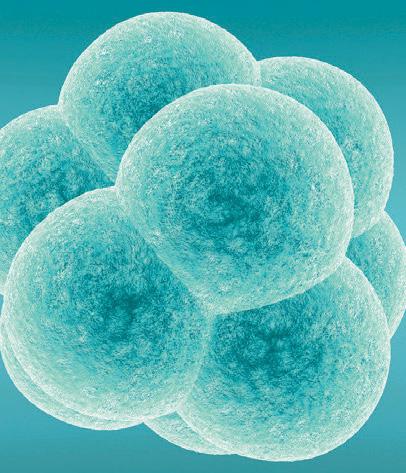
National Health and Hospitals Reform Commission Review Chaired by Professor Christine Bennett AO, former Research Australia CEO and Chair.
Research Australia launches Beyond Discovery
1999
2000
Research Australia established 2002 2003 2004 2005 2006 2007
NHMRC became an independent statutory agency
Health and Medical Research Strategic Review, Chaired by Peter Wills AC
NHMRC funding doubles
Research Australia establishes the University Roundtable
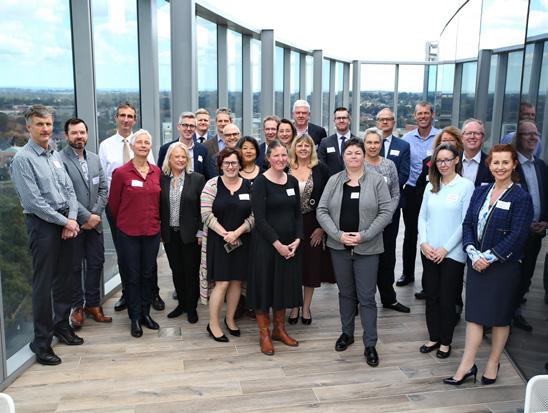
2009
Research Australia’s First Annual Public Opinion Poll
Sir Gustav Nossal appointed as Research Australia PatronNSW Health and Medical Research Strategic Review, Chaired by Peter Wills AC
-
Research Australia’s 10 Strategic Imperatives policy paper
MRFF created to deliver an extra $1 billion funding for health and medical research
2011 2012 2013

McKeon Strategic Review of Health and Medical Research
Research Australia’s inaugural conference: Philanthropy in Health and Medical Research

Research Australia’s survey of the impact of the pandemic on our sector published in The Lancet
Research Australia’s Collaborative Strategy (2017-2020)
Research Australia establishes the Health Economics Roundtable
MRFF reaches its target of $20 billion in capital 2015 2016 2017
$570 million Frontier Medical Research Program, Research Australia was proud to develop with the Commonwealth Department of Health
$500 million Biomedical Translation Fund established

Philanthropy Conference in partnership with the Victorian Government
Research Australia develops the MRFF Evaluation Framework in partnership with the Federal Government
COVID-19 Briefings for over 150 Ministers, Shadow Ministers, MPs, Department officials and advisors
Research Australia publishes the COVID-19 report series.

The impact of COVID-19 on health and medical researchers
A second survey on the impact of COVID-19 on health and medical researchers
27 Connect | Engage | Influence
researchaustralia.org
Research Australia Limited 384 Victoria St Darlinghurst NSW 2010 ABN 28 095 324 379
